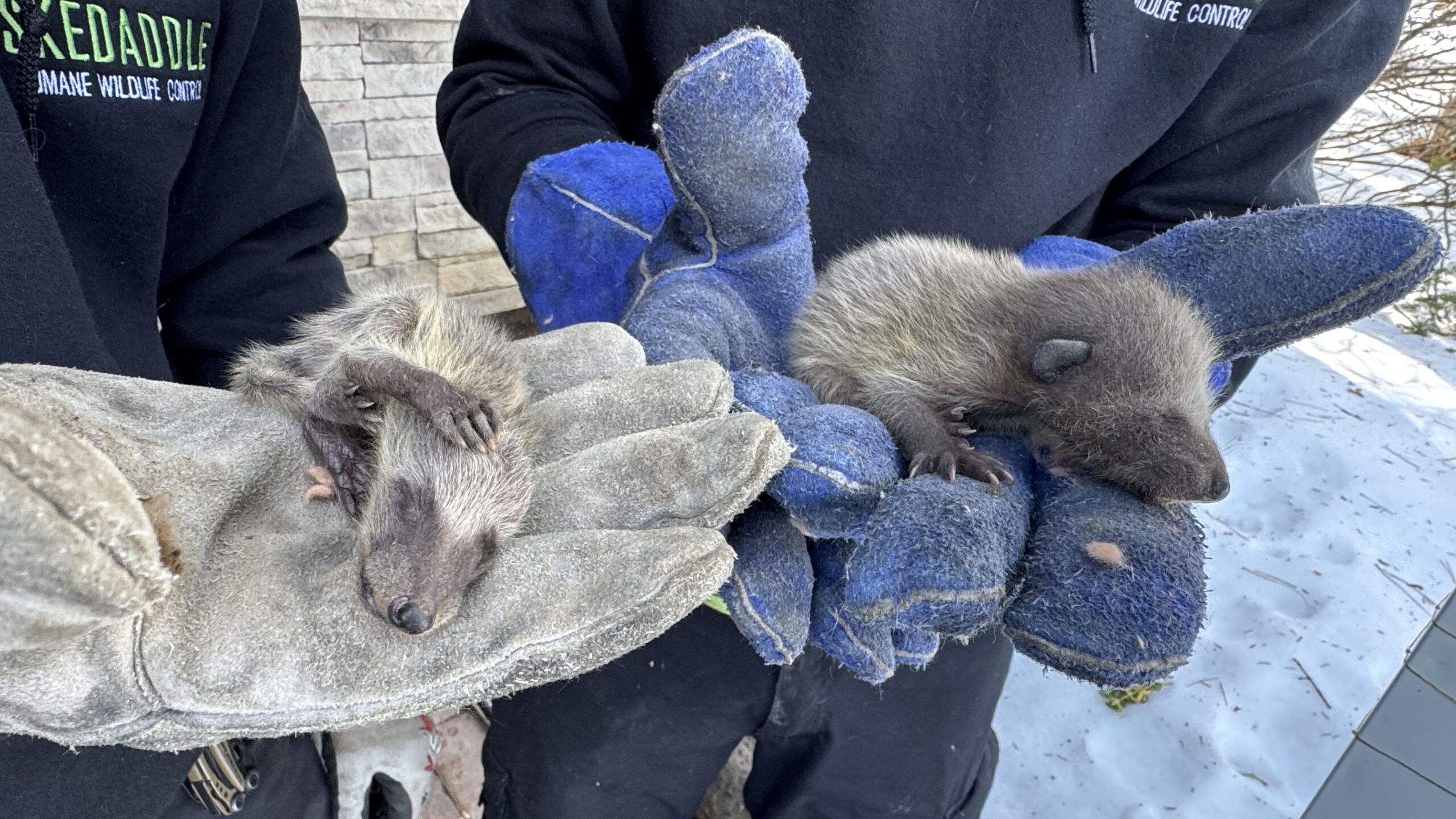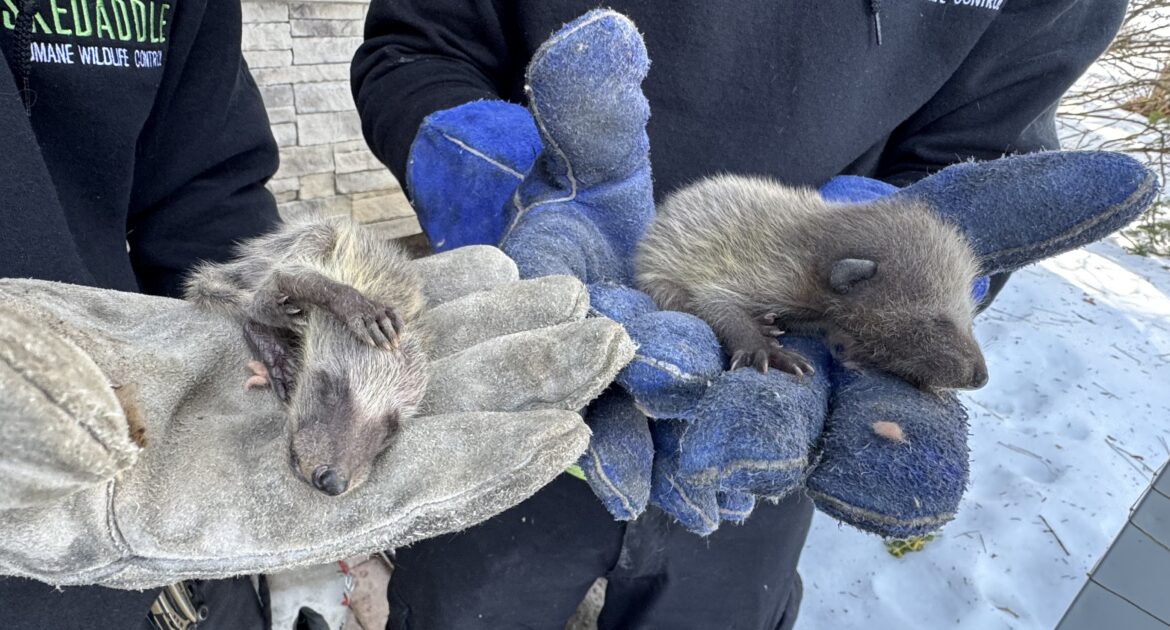If you’ve been hearing odd scratching noises or noticing damage around your home, you might have more than just a harmless pest problem. Richmond Hill residents may be surprised to learn that one of the most cunning intruders, raccoons, often finds its way into basements.
Can raccoons invade your basement? The answer is yes. These animals are resourceful and determined, capable of squeezing through the smallest gaps or even prying open loose vents. Their strength and ability to climb, dig, and adapt make basements a prime target for shelter. Unfortunately, their arrival often brings property damage, bad odours, and a significant mess.
Preventing raccoons from invading your basement is essential for safeguarding your home. Once inside, raccoons can cause extensive damage by tearing insulation, chewing through wires, and leaving droppings that pose serious health risks. Acting quickly at the first signs of their presence makes it much easier to address the problem.
At Skedaddle Humane Wildlife Control in Richmond Hill, we specialize in protecting homes by keeping raccoons out of spaces like basements. Read on to learn how to recognize warning signs, prevent future invasions, and protect your property against these uninvited guests.
Why Would Raccoons Enter Your Basement?
Basements provide everything raccoons need to feel safe and comfortable. These dark, quiet, and sheltered spaces are ideal hiding spots. Mother raccoons often seek places like basements to safely raise their young. With food sources like unsecured garbage bins, bird feeders, or pet food left outdoors, basements in residential areas become even more inviting.
Richmond Hill, with its mix of urban and green spaces, provides plenty of opportunities for raccoons to get comfortable in neighbourhoods, including your home. Cracks in foundation walls, broken vent covers, or unsealed crawl spaces are just some of the ways they can find entry. Once inside, they might rip insulation, chew electrical wiring, and even spread bacteria through their waste.
Signs of Raccoons in Your Basement
Raccoons leave clear evidence when they settle into your home. Spotting these signs early can prevent serious damage and higher costs down the road. Here’s how you can tell if raccoons might be spending time in your basement:
- Noises at Night: Raccoons are most active at night, so if you hear scratching, thudding, or faint chattering sounds after dark, it could mean trouble. These noises might come from walls, ceilings, or directly below your living space. For example, you might notice loud thumps as raccoons climb in and out of their entry points or hear a steady scratching sound as they create nests in your insulation. The sounds may be irregular, especially when baby raccoons, or “kits,” are involved, as they often cry for their mother in high-pitched squeaks.
- Strong Odours: Have you noticed an unpleasant smell you can’t quite pinpoint? Raccoon waste is one of the main culprits for strong odours in a basement. Their droppings, urine, and even leftover food scraps can create a smell that lingers through your home. If the smell seems to get stronger in certain areas, such as by foundation walls, corners, or vents, it could mean the raccoons have claimed your basement as their territory. Decaying food scraps they’ve brought inside can worsen the odour, making your home even less pleasant.
- Droppings and Stains: Check any dark corners or out-of-the-way spaces in your basement for droppings or urine stains. Raccoon droppings are typically larger and more cylindrical than those of other small animals, with a distinct, musky odour. Stains may appear as yellowish patches on floors and walls, and these can be particularly dangerous as they may spread bacteria or parasites. Finding these signs is not only unpleasant but also a strong indicator that you need to act quickly to address the problem.
- Damaged Materials: Raccoons are destructive animals. They tear through insulation, shred ductwork, and even chew on electrical wires. You might find holes in your basement ceiling or walls where they’ve been digging for new spaces. Chewed-up items like stored boxes, furniture, or even plastic containers are further signs that they’ve taken over. Damaged wires are especially concerning because they create a risk of electrical fires, making this a sign that you can’t ignore.
- Tracks or Scratches: Keep an eye out for tracks or scratches near potential entry points, like vents, windows, or basement doors. Raccoon tracks usually have five toes, with long and thin marks that resemble tiny human-like hands. You can sometimes see their muddy paw prints around windowsills, vents, or areas near your foundation. Scratches near wood or drywall can also indicate where raccoons have tried to squeeze through openings or widen their access points.
If you notice any combination of these signs, it’s a good indication that raccoons could be in your basement. Ignoring these red flags may allow the problem to grow, making it harder to deal with later.
How Do Raccoons Get Into Basements?
Raccoons are opportunistic animals that will exploit any vulnerabilities in the exterior of your home. They commonly enter basements through:
- Foundation Cracks: Even the smallest cracks and gaps in your foundation can be widened by determined raccoons.
- Open Vents or Utility Entry Points: Dryer vents, exhaust ducts, and other openings left unprotected can provide easy access.
- Broken Window Screens or Covers: Basements with unsecured or cracked window covers are targets.
Inspecting these areas regularly can help identify trouble spots before raccoons take advantage of them. Fixing these weak points is essential to keeping raccoons out of home spaces for good.
The Importance of Prevention
One of the best ways to protect against raccoons is to take proactive measures before they have a chance to invade. Addressing weaknesses in your home’s defences ensures these animals don’t see your property as an attractive place to settle. Tips to help with raccoon prevention include:
- Seal Foundation Gaps: Patch cracks and holes in your foundation with durable materials like concrete or metal flashing.
- Protect Vents and Openings: Cover vents, ducts, and window wells with high-quality metal mesh to stop animals from squeezing through.
- Secure Your Garbage: Use heavy-duty lids for garbage bins and store them in a closed area to eliminate easy food sources.
- Maintain Your Property: Regularly trim the greenery around your home’s exterior and keep the area tidy to reduce hiding spots.
- Inspect Crawl Spaces: Seal off unused crawl spaces under your home to block entry for raccoons or other wildlife.
What Happens if Raccoons Are Left Undisturbed?
Raccoons that settle into your basement won’t disappear on their own. The damage they cause can escalate quickly. They tear through insulation, chew wires (which increases the risk of electrical fires), and contaminate your living areas with waste. Over time, the structural integrity of your basement can suffer, leading to expensive repairs.
Raccoons can also carry harmful parasites and pathogens, like raccoon roundworm and rabies, putting you and your family’s health at risk. That’s why early detection and removal are critical to avoid long-term consequences.
Professional Help Goes the Extra Mile
When raccoons make their way into homes, one of the most reliable solutions is working with professionals. We at Skedaddle Humane Wildlife Control specialize in humane removal methods, ensuring animals are not harmed in the process. Their unique one-way door system allows raccoons to exit a home safely without harming them but prevents them from coming back inside.
The team also conducts detailed assessments of your property to identify and seal entry points. This approach not only removes the problem but also ensures it doesn’t happen again. Their experience and attention to detail help Richmond Hill homeowners avoid the stress and potential hazards of dealing with wildlife invasions.
Take Proactive Steps to Prevent Raccoons in Your Basement
If you’ve seen the signs of raccoons in your basement, it’s time to act. Skedaddle Humane Wildlife Control in Barrie provides effective, humane solutions to remove these animals safely. With experience handling wildlife invasions in Richmond Hill and beyond, their team understands how to keep raccoons out of home spaces permanently.
Don’t wait for the problem to get worse. Contact Skedaddle today to request an estimate and take the first step toward reclaiming your basement and protecting your home.




